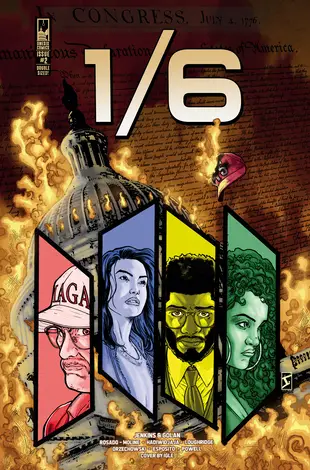
Harvard Law Professor, and veteran comic book artist Will Rosado are a formidable team. Together, they’re much like Alan Moore, Dave Gibbons, and John Higgins, and their pivotal work on Watchmen. Their latest work,1/6: The Graphic Novel, is probably the literal equivalent for Jenkins, Golan, and Rosado – something pretty darn seminal to the times we’re in, and may be in if we’re not careful. This week marks a significant milestone for the trio, as they released the second issue of 1/6: The Graphic Novel, continuing their deep exploration of themes that resonate with today’s societal challenges.
Regardless of what folks say about 1/6, the ramifications in and of themselves on a factual basis are clear. 1/6 in reality was a singular event in the history of our democracy, probably the first time in recent memory an actual, definitive coup and seizure of power was attempted in the highest office in the land. Something mentioned in multiple publications relevant to the tonality of 1/6 is Philip K. Dick’s infamous The Man in the High Castle, imagining a Third Reich and Empire of Japan-dominated United States on the East and West coasts. “…(there’s) a long tradition of the dystopian alternate reality in comic books.
This is a metaverse of madness for our democracy in some ways. We took our inspiration from the best of speculative fiction. Whether you look at George Orwell’s ‘1984’ or Margaret Atwood’s ‘The Handmaid’s Tale,’ or Octavia Butler’s large body of work,” Jenkins states, in an exclusive interview with Vice Magazine. “Those are cautionary tales. They are historical markers, they’re cultural calls to action. And ‘Man in the High Castle’ certainly fits well within that tradition. And we really are hoping we’re at least aspiring to reach that kind of storytelling.”
He also states, “…comic books are just an extremely popular and enduring vehicle for storytelling. If you are 80 years old in the United States, you grew up around comic books. If you’re 15, you grew up around comic books. Regardless of ideology, comic books can reach you and transport you. When a story is good, we lower our ideological filters and allow ourselves to be transported. And I think that’s especially important right now. Hopefully, we got that right.”
They certainly have. The panels in the first issue of 1/6, rendered in chilling and saturated color, show probably some of the most disturbing images conjured in recent memory with respect to autocracy. It’s easy to dismiss a future of flying cars and smog so dense it covers the night skies. To tip the hat to another Philip K. Dick work, Blade Runner adapted in 1982 at the height of Reaganomics, that work depicted a series of issues almost presciently – environmental and societal decay, an uncanny fusion of Chinese and American partnerships, and even AI (although no replicants on the record, as of 2019).
What Jenkins, Golan, and Rosado do with 1/6 isn’t prescient, nor in my opinion is it what they call ‘speculative fiction.’ It’s essentially a hypothetical documentary, something where every scenario – right down to the tanks rolling down the streets of Washington DC – is backed up by statements, sentiments, and yes – even plans – by people involved with the Big Lie scandal. So while it can be enjoyed as an immensely entertaining, superbly realized work, it also may go down in history as a singular warning to everyone turning its pages…
Kim Muncie
